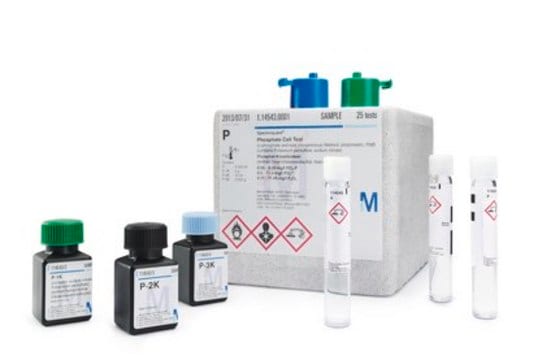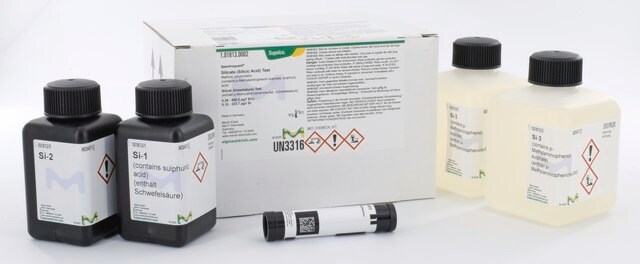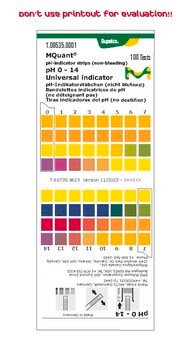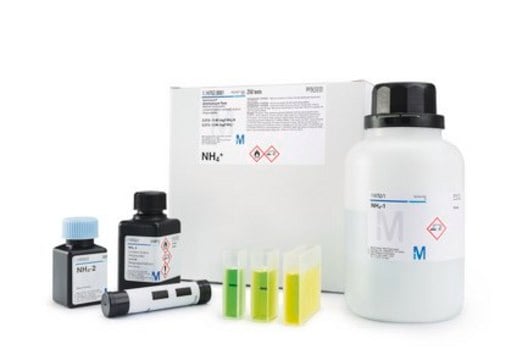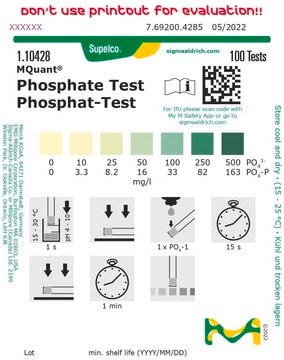1.19251
Oxygen Scavengers Test, photometric
photometric, 0.09-2.17 mg/L (MEKO), 0.08-1.95 mg/L (ISA), 0.05-1.32 mg/L (Hydro), 0.027-0.667 mg/L (Carbohy), 0.020-0.500 mg/L (DEHA), Spectroquant®
About This Item
Recommended Products
Product Name
Oxygen Scavengers Test, photometric, 0.09-2.17 mg/L (MEKO), 0.08-1.95 mg/L (ISA), 0.05-1.32 mg/L (Hydro), 0.027-0.667 mg/L (Carbohy), 0.020-0.500 mg/L (DEHA), Spectroquant®
product line
Spectroquant®
Quality Level
usage
sufficient for 200 tests
analyte functional class(es)
oxygen scavengers
measuring range
0.020-0.500 mg/L (DEHA)
0.027-0.667 mg/L (Carbohy)
0.05-1.32 mg/L (Hydro)
0.08-1.95 mg/L (ISA)
0.09-2.17 mg/L (MEKO)
technique(s)
photometry: suitable
compatibility
for use with Spectroquant® Move 100
for use with Spectroquant® Nova 60 A
for use with Spectroquant® Prove 100
for use with Spectroquant® Prove 300
for use with Spectroquant® Prove 600
detection method
photometric (Iron reduction)
storage temp.
15-25°C
General description
This Spectroquant® Oxygen Scavengers Reagent Test allows the accurate quantification of the oxygen scavengers content in aqueous samples.
Method applied: In the presence of oxygen scavengers iron(III) ions are reduced to iron(II) ions. These react with a triazine derivative (FerroZine™) to form a violet complex which is determined photometrically.
The Spectroquant® Reagent Test Kits contain highly stable, ready-to-use reagent mixtures to perform the analysis according to the procedure described in the accompanying instruction leaflet.
All our Cell and Reagent Test Kits are equipped with the unique Live ID (2D barcode) which allows seamless method recognition and contains essential information such as lot number, expiry date, and automatic calibration updates.
Application
- Food Packaging and Shelf Life Extension: Oxygen scavengers are extensively used in food packaging to extend the shelf life of products by preventing oxidation. Recent research has demonstrated the application of oxygen scavengers in gel electromembrane extraction for the simultaneous determination of nitrate and nitrite in sausage samples. This green methodology enhances the accuracy of food quality assessments and ensures the safety of packaged foods (Samkumpim et al., Food Chemistry, 2023).
- Advanced Material Science: Oxygen scavengers are used in the development and characterization of advanced materials, including biodegradable films for active packaging. Recent research has explored the fabrication of ultraviolet light-driven green oxygen scavenging composites made of PVA/NRL for food packaging, providing an alternative to traditional metallic oxygen scavengers. This application demonstrates the potential for creating sustainable and efficient oxygen-scavenging materials (Ramakanth et al., Green Chemistry, 2024).
Analysis Note
Legal Information
Not finding the right product?
Try our Product Selector Tool.
Signal Word
Danger
Hazard Statements
Precautionary Statements
Hazard Classifications
Acute Tox. 4 Inhalation - Eye Dam. 1 - Met. Corr. 1 - Skin Corr. 1
Supplementary Hazards
Storage Class Code
8B - Non-combustible, corrosive hazardous materials
WGK
WGK 1
Flash Point(F)
Not applicable
Flash Point(C)
Not applicable
Certificates of Analysis (COA)
Search for Certificates of Analysis (COA) by entering the products Lot/Batch Number. Lot and Batch Numbers can be found on a product’s label following the words ‘Lot’ or ‘Batch’.
Already Own This Product?
Find documentation for the products that you have recently purchased in the Document Library.
Our team of scientists has experience in all areas of research including Life Science, Material Science, Chemical Synthesis, Chromatography, Analytical and many others.
Contact Technical Service